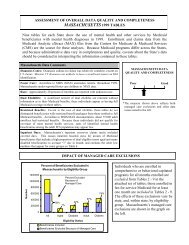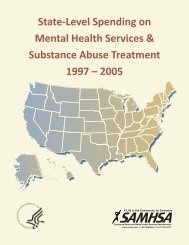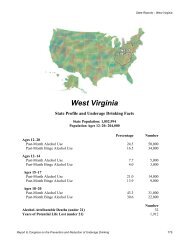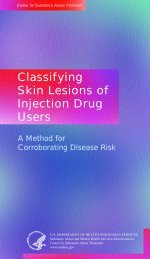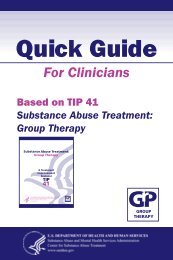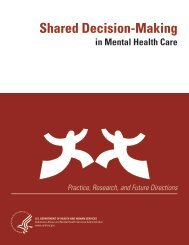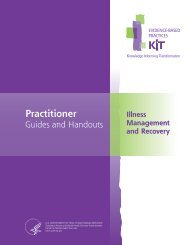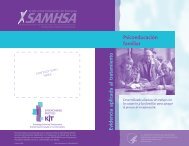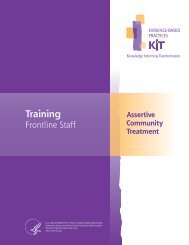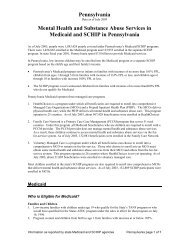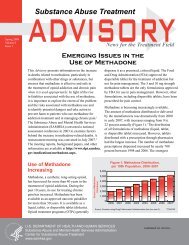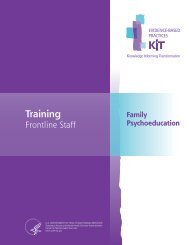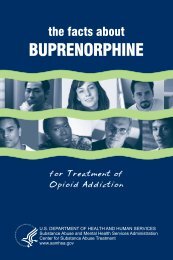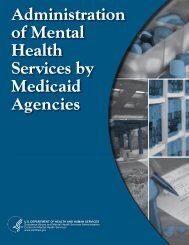TAP 21 - SAMHSA Store - Substance Abuse and Mental Health ...
TAP 21 - SAMHSA Store - Substance Abuse and Mental Health ...
TAP 21 - SAMHSA Store - Substance Abuse and Mental Health ...
You also want an ePaper? Increase the reach of your titles
YUMPU automatically turns print PDFs into web optimized ePapers that Google loves.
Addiction Counseling Competencies<br />
<strong>21</strong>2<br />
Luborsky, L., Diguer, L., et al. (1996). Factors in outcomes of short-term dynamic psychotherapy<br />
for chronic vs. nonchronic major depression. Journal of Psychotherapy Practice <strong>and</strong><br />
Research, 5(2):152-159.<br />
Lyter, S.C., & Lyter, L.L. (2000). Intervention with groups. In A.A. Abbott (Ed.) Alcohol, Tobacco,<br />
<strong>and</strong> Other Drugs: Challenging Myths, Assessing Theories, Individualizing Interventions.<br />
Washington, DC: National Association of Social Workers Press, 247-304.<br />
Maisto, S.A., & McKay, J.R. (1995). Diagnosis. In J.P. Allen & M. Columbus (Eds.) Assessing<br />
Alcohol Problems: A Guide for Clinicians <strong>and</strong> Researchers. NIAAA Treatment H<strong>and</strong>book<br />
Series, No. 4. Bethesda, MD: National Institute on Alcohol <strong>Abuse</strong> <strong>and</strong> Alcoholism, 41-54.<br />
Maisto, S.A., & Saitz, R. (2003). Alcohol use disorders: Screening <strong>and</strong> diagnosis. American<br />
Journal on Addictions, 12:S12-S25.<br />
Makover, R.B. (2004). Treatment Planning for Psychotherapists: A Practical Guide to Better<br />
Outcomes. Arlington, VA: American Psychiatric Publishing, Inc.<br />
Manhal-Baugus, M. (1996). Confidentiality: The legal <strong>and</strong> ethical issues for chemical<br />
dependency counselors. Journal of Addictions <strong>and</strong> Offender Counseling, 17(1):3-11.<br />
Manhal-Baugus, M. (1996). Reducing the risk of malpractice in chemical dependency<br />
counseling. Journal of Addictions <strong>and</strong> Offender Counseling, 17(1):35-42.<br />
Maracle, B. (1994). Crazywater: Native Voices on Addiction <strong>and</strong> Recovery. New York: Penguin<br />
Books.<br />
Mark, T.L., Kranzler, H.R., et al. (2003). Physicians’ opinions about medications to treat<br />
alcoholism. Addiction, 98(5):617-626.<br />
Marlatt, G.A., Barrett, K., & Daley, D.C. (1999). Relapse prevention. In M. Galanter & H.D. Kleber<br />
(Eds.) Textbook of <strong>Substance</strong> <strong>Abuse</strong> Treatment (2nd ed.). Washington, DC: American<br />
Psychiatric Association, 353-366.<br />
Marlatt, G.A., & Donovan, D.M. (Eds.) (2005). Relapse Prevention: Maintenance Strategies in<br />
the Treatment of Addictive Behaviors. New York: Guilford Press.<br />
Marrelli, T.M. (2000). Nursing Documentation H<strong>and</strong>book (3rd ed.). St. Louis, MO: Mosby.<br />
Martin, S.S., & Inciardi, J.A. (1993). A case management treatment program for drug-involved<br />
prison releases. Prison Journal, 73:319-331.<br />
Martino, S., Carroll, K., et al. (2002). Dual diagnosis motivational interviewing: A modification<br />
of motivational interviewing for substance-abusing patients with psychotic disorders.<br />
Journal of <strong>Substance</strong> <strong>Abuse</strong> Treatment, (23)4:297-308.<br />
Matano, R.A., & Yalom, I.D. (1991). Approaches to chemical dependency: Chemical dependency<br />
<strong>and</strong> interactive group therapy—A synthesis. International Journal of Group Psychotherapy,<br />
41:269-293.<br />
McCaughrin, W.C., & Price, R.H. (1992). Effective outpatient drug treatment organizations:<br />
Program features <strong>and</strong> selection effects. International Journal of the Addictions, 27:<br />
1335-1358.<br />
McCollum, E.E., & Trepper, T.S. (2001). Family Solutions for <strong>Substance</strong> <strong>Abuse</strong>: Clinical <strong>and</strong><br />
Counseling Approaches. New York: Haworth Press.<br />
McCollum, E.E., Trepper, T.S., et al. (2004). Solution-focused group therapy for substance<br />
abuse: Extending competency-based models. Journal of Family Psychotherapy, 14(4):27-42.<br />
McCrady, B.S., & Epstein, E.E. (1996). Theoretical bases of family approaches to substance<br />
abuse treatment. In F. Rotgers, D.S. Keller, & J. Morgenstern (Eds.) Treating <strong>Substance</strong><br />
<strong>Abuse</strong>: Theory <strong>and</strong> Technique. New York: Guilford Press, 117-142.<br />
McCrady, B.S., & Epstein, E.E. (Eds.) (1999). Addictions: A Comprehensive Guidebook.<br />
New York: Oxford University Press.<br />
McCrady, B.S., & Miller, W.R. (Eds.) (1993). Research on Alcoholics Anonymous: Opportunities<br />
<strong>and</strong> Alternatives. New Brunswick, NJ: Rutgers Center of Alcohol Studies.<br />
McIntosh, J., & McKeganey, N. (2000). The recovery from dependent drug use: Addicts’<br />
strategies for reducing the risk of relapse. Drugs: Education, Prevention & Policy, 7(2):<br />
179-192.



